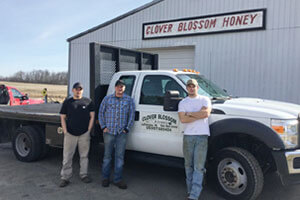
Indiana Beekeeper David Shenefield manages a highly successful 3,000 colony honey bee business from his home in LaFontaine, a small town with a population of 900 that’s located in the northeastern region of the state. Family members play a key role in the day-to-day running of the state’s largest beekeeping operation—appropriately named Clover Blossom Honey.
David stressed that while each employee may have a personal preference they enjoy performing in the bee business, they all do whatever is needed to help out during the different seasons.
Whether it’s in the honey production side, pollination, nuc sales, or queen rearing, it’s a team effort that today includes nine employees. The initial family bee business started back in the late 1950’s with David’s dad, Don, when he first took up beekeeping as a hobby. As the bee business grew Don Shenefield expanded his operations into raising queens. In 1970 he started taking his colonies to Texas for the winter. Today, at the age of 86 Don is semi-retired from the bee business, but he still manages one bee yard and when the month of June 2016 rolls around he claims he’s ending his favorite beekeeping activity–queen rearing.
After graduating from high school and before joining the military, David worked for a while in the Indiana State Highway’s parts department and then studied printing at a vocational School. He then worked a year for a printing company. It wasn’t until 1977 when he joined his dad in the bee business after serving a tour of duty in the U.S. Army. He was deployed as a motor pool Sargent stationed in Germany on his last assignment.
David explains that presently his 83 year old mother, Janice, who raised five children and retired from a banking career, is still handling the duties as Clover Blossom Honey’s bookkeeper as well as answering the phone.
David and his wife, Gloria, have two grown sons, Cory and Derek, third generation beekeepers, who are both working fulltime with the family bee business. Cory does some work in hive management, delivers honey and has taken over (from his granddad Don) most of the raising of queens and cells, while Derek works mostly in the bee yards. Gloria retired as a U.S. Postal Rural Carrier and now enjoys spending time with their grandkids and playing an occasional Texas hold em poker game.
An additional family member who has worked with the company for 20 years is David’s younger sister, Beth. David said she’s their jack-of-all-trades person and besides working the hives and assisting with raising queens, she’s in charge of shop maintenance and helps with extracting honey, bottling and market delivery. She also has some 100 beehives of her own.
Years ago his male siblings, Chuck and Mike, also worked with their dad with the bees, but they no longer do so. Now they both are supervisors in manufacturing plants. David says his oldest sister, Susan, is the only family member who has never been involved in the bee business. She owns and works at a beauty salon.
Don recalls as a child when growing up that his grandfather kept a beehive in the family orchard to pollinate the trees. In 1959 he befriended some local beekeepers who encouraged him to take up beekeeping as they were convinced he’d like it. So he did take up beekeeping and he did like it. When he started keeping bees Don initially did all his inside bee duties (bee box construction, frame building and honey extraction) in his basement. He later moved this bee work into a barn and once a building was finished into a honey house.
Until 1974 Don’s bee business was strictly a sideline affair, but that was the year he transitioned to being a full time commercial beekeeper and quit his job as a tool die maker.
According to David, they’re currently running 3,000 hives with their main focus centered on honey production. During the year the number of bee yards will vary falling somewhere between 125 to 150. Most of these are located in the northern end of the state. They do, however, keep around 100 hives in southern Indiana used specifically for splits and nuc production.
David said that they keep about 1,000 hives on bottom boards and these will stay …


